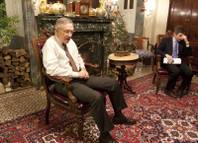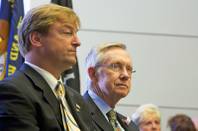Wednesday, Sept. 26, 2012 | 2 a.m.
Related coverage
- Senate OKs measure to give Nevada boost in online poker (5-30-2011)
- Internet poker bill advances in Nevada (5-24-2011)
- Lawmakers pushing for federal Internet poker law under pressure to act (01-13-2012)
- Bill would set regulations for Internet poker (3-10-2011)
- NV considers Internet poker bill, but casinos balk (3-10-2011)
- Lawmakers push to regulate, tax online gaming (5-19-2010)
- With aggressive push, Internet gambling again in play (2-9-2010)
- More political news from the Sun
If the recent airing of the dirty laundry — including the trading of public insults between Sens. Harry Reid and Dean Heller — is any indication, the delicate effort to legalize online poker is mired in deep political quicksand.
While that show has been playing for the public, however, lawmakers are continuing to work on a backup plan, in which they hope to avoid explosive public fights altogether and quietly resolve the poker standoff behind closed doors.
And it appears Plan B — “or D or E,” as Reid Chief of Staff David Krone put it in an interview last Friday — may actually have been the plan all along.
Back in January, just a few weeks after the Department of Justice released an interpretation of the Wire Act that would inspire more than a dozen states to start pursuing their own Internet gaming ventures, Krone sat down to dinner with his then-counterpart in the House, Barry Jackson, former chief of staff to House Speaker John Boehner.
They came up with a plan, Krone said, in which Reid and Boehner could rein in that Wire Act reading while legalizing interstate Internet poker, all without too many fireworks.
The online poker effort being pushed by Nevada’s gaming industry is twofold. First, Congress must halt the proliferation of state-based online gambling made possible last year by the Department of Justice’s interpretation of the Wire Act . Then, Congress must legalize online poker and craft a national scheme for regulating it.
The two-pronged strategy is complicated: While it’s fairly easy to find a filibuster-proof majority of lawmakers who support walking back the Wire Act, lawmakers who then support giving poker special treatment are in shorter supply.
But Krone said he and Jackson saw a way around all that: by doing the bulk of the detail work in their own chambers instead of on the floor.
When Reid’s office drafted the poker bill, they produced two versions: a full-fledged bill and a bare-bones “placeholder,” designed to be inserted innocuously into a much larger bill and touching on just enough gaming and poker topics to let lawmakers discuss them in a conference process.
The existence of two versions is important — and not just because a summary of the full-fledged bill has been circulating in public for weeks while the the placeholder language is still under wraps.
The conference process the placeholder version is designed for is how Congress reconciles matters when the House and the Senate have passed related, but not identical, bills. Traditionally, special committees are appointed to do that work, but lately, it has been left to Reid and Boehner.
They can’t bring up new topics in conference. But they can negotiate deals around topics that already are in the bills.
That’s why the placeholder is potentially critical — if a poker placeholder is in even just one version of any Senate or House bill, Reid and Boehner can hash out a deal and deliver it back to the House and Senate for part-and-parcel approval.
But, Krone maintained, it would only work if the Senate went first.
“You guys would need to go first,” Krone said Jackson told him.
A spokesman for Boehner’s office was not able to confirm Tuesday whether Jackson ever did make that deal.
But Heller doesn’t agree that Senate-first is the way forward.
Heller wants to take advantage of the conference process, too. But he thinks that instead of insisting that the Senate lead the way with placeholder language, the House should be allowed to pass a bill getting rid of all online gaming. Then Reid and company can use the conference process to get special dispensation for poker.
“As discussed, it would be beneficial for the House of Representatives to first address this issue and then proceed with Senate action,” Heller wrote in a letter to Reid on Sept. 10.
On the one hand, he has a point. The Senate already tried once this year to get an Internet gaming placeholder inserted into larger legislation: the Department of Homeland Security appropriations bill.
Emails between Krone and Heller’s former Chief of Staff Mac Abrams document how lawmakers tried, but ultimately failed, to do just that.
But on the other, in Heller’s scenario, getting the two sides into a conference room potentially is much harder — and much riskier for Nevada’s most important industry.
Heller’s scenario would allow House Republicans a tantalizing opportunity to vent their spleen by voting to outlaw all forms of Internet gaming while also taking jabs at three of their favorite targets: President Barack Obama, Attorney General Eric Holder and Reid.
The result — a bill with no poker carve-out — would be catastrophic for Nevada, unless Reid is able to counter with a pro-poker answer from the Senate, which would force the all-important conference to take place.
But right now, no one is sure they have the votes to guarantee that outcome.
Reid and Heller have been unable thus far to put together the 60 senators needed to give online poker clear sailing — a fact for which Reid publicly blames Heller and his inability to come up with 15 Republicans willing to vote for a poker-only bill.
But Krone admitted Friday that Reid isn’t entirely sure of their 45 votes either, as they have yet to conduct a whip count or put names to paper. That means that proponents of web poker cannot be sure their interests would be safe under Heller’s scenario. Reid would need a solid coalition of at least 40 to guarantee that any bill coming from the House would be dead on arrival in the Senate — and then 60 to get a bill of his own through.
Krone said it would be tough to get any poker bill — placeholder or otherwise — through Congress during the post-election lame duck period. At this point, the very public flaps about online poker have put lawmakers who are opposed to legalizing the practice on high alert.
If the Senate goes first, the most likely vehicle for poker legislation will be a high-profile tax bill Congress must consider by year’s end.
But if not, Reid said last Friday that he wasn't opposed to the House going first in principle.
“But let them pass the damn thing!" Reid told reporters. "They’ve been waiting for a year.”


No comments:
Post a Comment